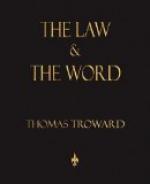they at once set a limit to the expansion of ideas,
and do not see that the scientific principle of discovery
is not confined to laboratory experiments. Therefore,
we must not let ourselves be discouraged by such arguments.
If our friends doubt our sanity, let them doubt it.
The sanity of such men as Galileo and George Stephenson
was doubted by their contemporaries, so we are in good
company. At the same time we must not neglect
to look after our own sanity. We must know some
intelligible reason for our conclusions, and realize
that however unexpected, they are the logical carrying
out of principles which we can recognize in the Creation
around us. If we do this we need not fear to
spread the wings of fancy, even though some may not
be able to accompany us; only we must remember that
we are using wings. Fancy, in the ordinary acceptation
of the word, has really no wings; it is like a balloon
that just floats wherever any passing current of air
may drive it. The possession of wings implies
power to direct our flight, and fancy must be converted
into trained Imagination, just as the helpless balloon
has been superseded by navigable air-craft. It
must be “the scientific imagination”; and
the “scientific imagination” carried into
the world of spiritual causation becomes the Word
of Power, and its Power is derived from the fact that
it is always working according to Law. Then we
may go on confidently, because we are following the
same universal principles by which all creation has
been evolved, only now we are specializing its action
from the standpoint of our own individuality, according
to the ancient teaching that Man, the Microcosm, repeats
in himself all the laws of the Macrocosm, or great
world, around him.
As we begin to see the truth of these things, we begin
to transcend the simply generic stage. That first
stage is necessary to provide a starting-point for
the next. The first stage is that of Bondage to
Law. It could not be otherwise for the simple
reason that you must learn the law before you can
use it. Then from the stage of Generic Creation
we emerge into that of individual Creation, in which
we attain liberty through Knowledge of the Law of
our own Being; so that it is not a mere theological
myth to talk of a New Creation, but it is the logical
outcome of what we now are, if, to our recognition
of the Power of the Law we add the recognition of
the Power of the Word.
CHAPTER V
THE SOUL OF THE SUBJECT
We may now turn to speculate a little on some conceivable
application of the general principle we have been
considering. It seems to me that, as a result
of the generic creation of which I have just spoken,
there is in everything what, for want of a better
name, I may call “The soul of the subject.”




